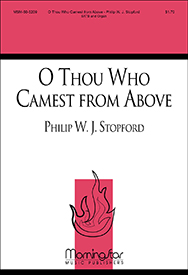- |
User Links
O Thou Who Camest from Above

O Thou who camest from above
Author: Charles Wesley (1762)Published in 174 hymnals
Printable scores: PDF, MusicXMLPlayable presentation: Lyrics only, lyrics + musicAudio files: MIDI, Recording
Representative Text
1 O thou who camest from above
the fire celestial to impart,
kindle a flame of sacred love
on the mean altar of my heart!
2 There let it for thy glory burn
with inextinguishable blaze,
and trembling to its source return
in humble prayer and fervent praise.
3 Jesus, confirm my heart's desire
to work, and speak, and think for thee;
still let me guard the holy fire,
and still stir up the gift in me.
4 Ready for all thy perfect will,
my acts of faith and love repeat;
till death thy endless mercies seal,
and make the sacrifice complete.
Source: Ancient and Modern: hymns and songs for refreshing worship #258
Author: Charles Wesley
 Charles Wesley, M.A. was the great hymn-writer of the Wesley family, perhaps, taking quantity and quality into consideration, the great hymn-writer of all ages. Charles Wesley was the youngest son and 18th child of Samuel and Susanna Wesley, and was born at Epworth Rectory, Dec. 18, 1707. In 1716 he went to Westminster School, being provided with a home and board by his elder brother Samuel, then usher at the school, until 1721, when he was elected King's Scholar, and as such received his board and education free. In 1726 Charles Wesley was elected to a Westminster studentship at Christ Church, Oxford, where he took his degree in 1729, and became a college tutor. In the early part of the same year his religious impressions were much deepene… Go to person page >
Charles Wesley, M.A. was the great hymn-writer of the Wesley family, perhaps, taking quantity and quality into consideration, the great hymn-writer of all ages. Charles Wesley was the youngest son and 18th child of Samuel and Susanna Wesley, and was born at Epworth Rectory, Dec. 18, 1707. In 1716 he went to Westminster School, being provided with a home and board by his elder brother Samuel, then usher at the school, until 1721, when he was elected King's Scholar, and as such received his board and education free. In 1726 Charles Wesley was elected to a Westminster studentship at Christ Church, Oxford, where he took his degree in 1729, and became a college tutor. In the early part of the same year his religious impressions were much deepene… Go to person page >Text Information
| First Line: | O Thou who camest from above |
| Title: | O Thou Who Camest from Above |
| Author: | Charles Wesley (1762) |
| Meter: | 8.8.8.8 |
| Source: | Adapt.: Jubilate Hymns |
| Language: | English |
| Copyright: | Public Domain |
English
- A Church of England Hymn Book: adapted to the daily services of the Church throughout the year #209
- A Collection of Hymns Adapted to the Use of the Methodist Episcopal Church #d461
- A Collection of Hymns Adapted to the use of the Methodist Episcopal Church Including the Whole Collection of the Rev. J. Wesley #ad461
- A Collection of Hymns and Spiritual Songs, Generally Used at Camp and Prayer Meetings #d173
- A Collection of Hymns for Public, Social and Domestic Worship #d646
- A Collection of Hymns for Public, Social, and Domestic Worship #625
- A Collection of Hymns for Public, Social, and Domestic Worship #d645
- A Collection of Hymns for the use of the African Methodist Episcopal Zion Church in America #572
- A Collection of Hymns for the Use of the Methodist Episcopal Church: principally from the collection of Rev. John Wesley, M. A., late fellow of Lincoln College, Oxford; with... (Rev. & corr.) #141
- A Collection of Hymns for the Use of the Methodist Episcopal Church: Principally from the Collection of the Rev. John Wesley. M. A. #141 10 shown out of 130
French Creole
Korean
Notes
O Thou Who camest from above. C. Wesley. [For Holiness, and for Earnestness in Work.] Published in his Short Hymns, &c, 1762, vol. i. p. 57, in 2 stanzas of 8 lines. (Poetical Works, 1868-72, vol. ix. p. 58). It was included in the Wesleyan Hymn Book, 1780, No. 318, and has become one of the most popular hymns in the Methodist denominations. To some hymnbook compilers the opening lines of stanza ii.,
"There let it for Thy glory burn
With inextinguishable blaze,"
have presented difficulties which have caused its omission from many collections. Bishop E. H. Bickersteth, in his Hymnal Companion, has done much towards removing this difficulty by rendering the lines:—
"There let it for Thy glory burn
Unquenched, undimmed in darkest days."
This reading has been adopted by others. Bp. Bickersteth's note thereto explains the cause and meaning of the change:—
" The Editor believes that this admirable hymn would have been far more popular if it had not been for the very long word 'inextinguishable.' Words of five syllables must be admitted into hymns sparingly; but for a whole congregation to be poised on six, practically leads to a hymn being passed by. It is hoped that the line given in the text, which only paraphrases the same thought, will be allowed."
In Martineau's Hymns, 1840, and 1873, the opening line of this hymn is changed to "O Thou, Who deignest from above."
--John Julian, Dictionary of Hymnology (1907)
Tune
HEREFORD (Wesley)WILTON (Stanley)
WAREHAM (Knapp)
William Knapp (b. Wareham, Dorsetshire, England, 1698; d. Poole, Dorsetshire, 1768) composed WAREHAM, so named for his birthplace. A glover by trade, Knapp served as the parish clerk at St. James's Church in Poole (1729-1768) and was organist in both Wareham and Poole. Known in his time as the "coun…


 My Starred Hymns
My Starred Hymns




